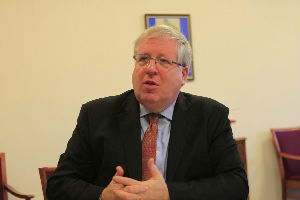Website challenges China's "crab and persimmon" myth
Updated: 2013-10-25 10:23
(English.news.cn)
|
|||||||||||
In a country where food taboos are as rich as the culinary culture, you may get a well-meaning warning when you ask for fruit after a crab feast.
Crab, according to Chinese folk sayings, will cause diarrhea when eaten with persimmon, and the list of its incompatible partners -- if regional varieties of the legend are counted -- also includes grapes, pears and many other fruits.
Likewise, many other food pairings are described as harmful by the "conflict food" theory, including eggs and soya milk, and honey and Chinese onions. The idea is so popular in China that it appears in cookbooks, talk shows and even the "10 health tips" posted on the walls of some community clinics.
But a group of Chinese science writers is determined to slay the sacred cow of the folk wisdom.
On Guokr.com, a popular science website, the conflict food theory is listed among the most widespread myths concerning daily life, along with "Vitamin C prevents flu" and "Pregnant women should wear radiation protection suits."
"In fact, most of the food pairing taboos are groundless," said Xu Lai, the site's chief editor. "Back in 1935, Chinese scientists conducted experiments to discredit such myths."
One explanation for the crab-and-persimmon myth may be that persimmon contains tannic acid, which can cause stomach ache if digested in excess, while crabs are prone to rotting. However, such health risks remain the same whether eaten together or separately, an article on Guokr explains.
On Guokr, similar "ancient wisdoms" and other pseudoscience are placed under scrutiny by experts and students from all fields of science. With their expertise, the website has debunked famous rumors like "super moon will cause super earthquakes" and "poisoned rats are cooked as pigeon meat."
Analysts say that, as rising social networks in China cause rumors to spread faster and wreak more havoc, closer cooperation is now needed between government and social forces, including scientists and media, to reverse the trend.
Related Stories
Food security concerns despite bumper harvest 2013-10-16 14:13
Cafe Noir hosts Singapore food festival 2013-10-14 16:29
Food for sharing 2013-10-13 08:27
China finds 311 batches of bad imported food 2013-09-30 10:09
GM foods make its way to China market 2013-09-29 10:49
Today's Top News
Vice-premier calls for strengthened EU ties
Beijing discusses ban on idling motor vehicles
Ban to help protect kids from sexual predators
Returnees are 'seed capital' for startups
Samsung's response fails to satisfy users
EU asked to ease visa restrictions
PMI heads for 7-month high
Growing row to eclipse EU summit
Hot Topics
Lunar probe , China growth forecasts, Emission rules get tougher, China seen through 'colored lens', International board,
Editor's Picks

|

|

|

|

|

|





